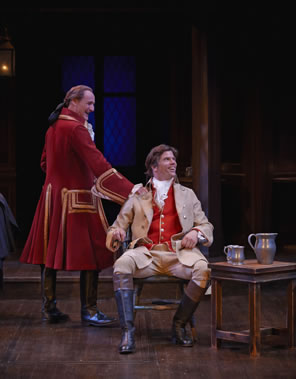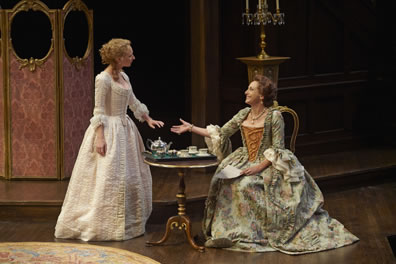The Beaux' Stratagem
Championing Second Siblings and Stuck Wives
By George Farquhar
Stratford Festival, Festival Theatre, Stratford, Ontario
Friday, August 29, 2014, Aisle 8, J–63&64, right, middle orchestra
Directed by Antoni Cimolino
Now ye gods, stand up for little brothers! And women in miserable marriages.

Archer (Colm Feore, standing) waits on Aimwell (Mike Shara) at the inn in Lichfield, where the two friends have come to wive it wealthily in the Stratford Festival's production of George Farquhar's The Beaux' Stratagem at the Festival Theatre. Photo by Michael Cooper, Stratford Festival.
In The Beaux' Stratagem, something a little more than a trifle but somewhat less than great, George Farquhar tackles two great social issues of his time (1707): the disenfranchisement of younger brothers in an economy based on primogeniture, and the disenfranchisement of unhappy wives. Yet, this is a comedy, a typical Restoration–Era joke-filled play poking fun at social strata and city life versus country ways. The play has its witty passages, but overall Farquhar's cleverness leans toward the simple end of the spectrum. Then again, though just 30, he wrote The Beaux' Stratagem on his deathbed, and it certainly reveals a playwright who might have eventually become one of England's greats.
If it's a middling play with an era-specific aesthete (we'll discuss the play's feminist bent in a bit), why do it? Because the Stratford Festival can do it so well. Under the sure-handed direction of Antoni Cimolino, and with a capable cast dressed authentically by Designer Patrick Clark and led by this Stratford season's superhero, Colm Feore, The Beaux' Stratagem is a non-stop laughfest. With this production, this period piece proves in more ways than one it suits more than its own timeframe. Sitting next to me in the Festival Theatre performance Sarah and I attended was a girl somewhere between 14 and 17 and, presumably, her younger brother. She was giggling, squealing, and laughing throughout the play, enjoying the plot, the situation, the jokes, and the slapstick; her brother seemed to be having a good time, too. Stratford Festival's Artistic Director Cimolino may be honoring a piece of theater history in choosing this title, but theater's future is well served with this production, too.
The Beaux' Stratagem centers on the adventures of Aimwell and Archer, two friends who, as younger siblings denied inheriting their fathers' estate and already having spent their allowances, are traveling through the English provinces in search of women with fortunes whom they can trick into marriage. Arriving in Lichfield, Aimwell pretends to be his eldest brother, and Archer pretends to be his footman. If they strike out here, they plan to move on to the next province where they will switch roles, Archer playing a lord and Aimwell the servant.
But here in Lichfield reside the Sullens. Squire Sullen is what his name suggests, a dour man interested only in drinking and gaming (the original dramatis personae describes him as "a country blockhead, brutal to his wife"). Mrs. Sullen was married to him by her father, and she is now stuck in a loveless marriage and a boring country manor (she's from London). Also in the household is Sullen's mother, Lady Bountiful, famous in the county as a healer, and his half sister, the gorgeous Dorinda.
The action takes place alternatingly at the inn where Aimwell and Archer alight and the Sullen manor house. When Aimwell starts his reconnoitering by attending church on Sunday, he spies Dorinda, she sees him, and the game is afoot. The ensuing plot includes highwaymen (who are certain Aimwell and Archer are also highwaymen), Mrs. Sullen's failed attempt to make her husband jealous by arranging to have him eavesdrop on a captured French count courting her ("If you can contrive any way of being a whore without making me a cuckold, do it and welcome," Squire Sullen says), and a Sullen servant, Scrub, infatuated with the maid Gipsy but discovering his rival to be an Irish priest pretending to be a continental chaplain to the French prisoners in town. Yeah, it's all kind of convoluted.
Furthermore, Farquhar's peripheral characters are blatant stereotypes. The innkeeper Boniface adds the phrase "as the saying is" as condiment to almost every sentence he speaks. The true origin of the Irishman Foigard is discovered simply by Archer pretending to be Irish himself and calling him "cussen Mackshane," whereupon Foigard automatically returns to his natural brogue. Similarly, the French Count Bellair is ever issuing the epithet "begar" and butchers English. Yet, how astutely wounding is his observation after Mrs. Sullen admits to using him as a plant in her scheme against her husband without any intent of damaging her virtue: "Begar, madam, your virtue be vera great, but garzoon your honeste be vera little" (I'm quoting from the second edition New Mermaids' text of the play, published by W.W. Norton in 2006).
In such little ways does Farquhar slice through convention with this play—and in one big way: the whole plot revolves around not Aimwell and Dorinda, but their seconds and close friends, Archer and Mrs. Sullen, respectively. Despite his assigned role, Archer cannot be what he is not: a subservient, dull, unlearned footman. He is, in fact, the opposite of all that: commanding, clever, and quite the intellect. He's also a mercenary cad, more interested in sex and money than marriage and romance. He first sets his sights on the innkeeper's daughter, but he is quickly swept away by the sparkling sophistication of Mrs. Sullen. She, in turn, is intrigued by this "very pretty fellow." "The devil take him for wearing that livery," she says of Archer's servant's clothes, though she already suspects he is not what he professes to be.
Playing Mrs. Sullen, Lucy Peacock—a 27-year veteran of the Stratford Festival—negotiates her character's urge to join Archer in his flights of fancy (i.e., a rendezvous between them) while maintaining her virtue. Their flirtations become open, though she never allows any actual opening for him to sally forth physically. When he does manage to plant himself in her bedchamber at night, we get a wonderful moment in which Mrs. Sullen, through asides, lets us see how close she is to giving in to Archer's charms. Most of this early 21st century audience, knowing her marriage plight, would say, "go for it, girl," but such is Farquhar's portrait and Peacock's portrayal that an early 18th century audience probably also would have said, "To't, madam."
Feore brings a frantic Robin Williams quality to the part of Archer: fast on his feet, audacious in his wit, a dust devil of comic verve. His is a stunning, tour de force performance, made all the more amazing in the fact that he's playing this part in repertory with his landmark portrayal of William Shakespeare's King Lear. When you compare the stillness and deeply inner-searching nature of his Lear to the romantic showoff and vibrant energy of his Archer, you'll come to the conclusion that you are seeing two totally different actors.
Cimolino deserves much credit in the pacing and blocking of this production, too. He gets us through some obtuse deployments of various plot elements, and he smooths out the confusing action when highwaymen, lovers, husband, and Mrs. Sullen's brother—suddenly arrived from his travels abroad—all descend on the manor house. Two scenes illustrate expert company choreography. In one, Sullen (Scott Wentworth) emerges from his hiding place where has been overhearing the courting of his wife and Count Bellair (Evan Buliung) with his sword drawn; Mrs. Sullen immediately pulls a pistol on him, and Bellair finds himself ducking both wayward sword and unaimed gun. In the other, as his means to gain entry to the Sullen Manor and Dorinda (Bethany Jillard), Aimwell (Mike Shara) feigns a sudden sickness outside the manor gates, just at the time the famous resident healer, Lady Bountiful (Martha Henry, the Festival's grand dame in her 40th season there), is in the house. As Lady Bountiful attends to the strategically seizure-suffering Aimwell, Dorinda scurries into position to take advantage of Aimwell's seizures, and Mrs. Sullen and Archer do their own flirtatious pas de deux.

Dorinda (Bethany Jillard, left), comforts her sister-in-law Mrs. Sullen (Lucy Peacock), who is stuck in a loveless marriage to Dorinda's half brother, Squire Sullen, in the Stratford Festival's production of George Farquhar's Restoration Comedy The Beaux' Stratagem at the Festival Theatre. Photo by Michael Cooper, Stratford Festival.
Underneath it all, Farquhar lands some peculiar punches. The playwright perhaps reveals much of his own attitude by making his centerpiece hero, Archer, a character who, essentially, belongs to all classes: sometimes pretending to be a lord, sometimes pretending to be a servant, descended from gentry yet poor in fact. He defies being stratified. Through Mrs. Sullen, Farquhar attacks the laws of the time forbidding divorce except for extreme circumstances. The only route to her freedom from Squire Sullen is for a future husband to buy him off. One act ends with Mrs. Sullen alone on stage speaking a soliloquy in which she ponders the "golden links of wedlock" and "iron manacles of law." A moral in couplet verses, Peacock's delivery turns it into a feminist manifesto that's 400 years ahead of its time (I'm writing this review as the controversy over former Baltimore Raven Ray Rice is raging).
Farquhar's other social complaint, that of the plight of second and subsequent sons, is played out not only in the main plot but in several key lines along the way. When Mrs. Sullen and Dorinda hear of Aimwell's supposed identity, Mrs. Sullen says, "I have heard my brother talk of my Lord Aimwell, but they say that his brother is the finer gentleman." The smitten Dorinda confidently replies, "That's impossible, sister." Mrs. Sullen is, of course, unknowingly referring to Aimwell himself, the "brother" with whom Dorinda unknowingly is smitten. When the highwaymen are robbing the manor, one reveals that his doing so is the result of being a younger brother. And hanging over all second and subsequent sons is the specter of military service, something Aimwell, Archer, and even Scrub (Gordon S. Miller) know is stalking them.
Still, Farquhar remains a product of his own time. His characters certainly are brave in their intents—at one point, we see the possibility of Dorinda marrying Aimwell even after his confession that he is not who he says he is, and we sense that Mrs. Sullen will ultimately, and happily, give in to Archer who could yet prove true to her. Farquhar, however, backs off these courageous after-play lives and instead calls on fate to intervene and the math to miraculously add up on behalf of the couples. But, hey, it's a Restoration-Era romantic comedy: they love, we laugh, social precepts are questioned if not directly challenged, and then society goes on exactly as it is.
But at least everybody is smiling now.
Eric Minton
September 11, 2014
Comment: e-mail editorial@shakespeareances.com
Start a discussion in the Bardroom



 Find additional Shakespeareances
Find additional Shakespeareances